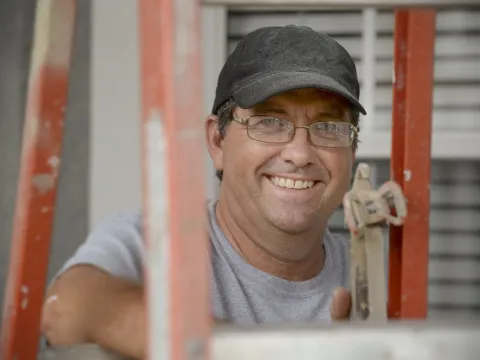- AdventHealth

A cancer diagnosis can be a life-changing experience. You’re ready to stand up to cancer and do everything you can to beat in. In the process, however, you might not realize all of the ways your whole health may be affected.
In fact, one of the lesser known risks of certain chemotherapy medications is hearing loss.
“A lot of people don’t realize the risk of permanent hearing loss with chemotherapy,” explains Lisa Spiegel, AuD, CCC-A, clinical audiologist at AdventHealth Sports Med and Rehab.
While this isn’t a side effect that should prevent anyone from undergoing chemotherapy treatment, it is something of which people should be aware, because it can be monitored throughout and after treatment.
This monitoring allows audiologists like Dr. Spiegel to offer ways to compensate for hearing loss through devices such as hearing aids and through improved communication strategies.
Dr. Spiegel says that it’s important for patients undergoing chemotherapy to be aware of this because the earlier you diagnose hearing loss and start with hearing aids, the easier it is for your brain to adapt to them.
In addition, some oncologists will adjust the chemotherapy dose or medication if the chemotherapy is affecting a patient’s hearing significantly.
She adds, “Oncologists often review the risk of hearing loss with patients, and some patients are then referred to us for a baseline hearing screening as well as regular hearing exams. This is especially true for pediatric patients because hearing loss can significantly impact their development and ability to learn.”
But it’s not just kids whose lives are affected by hearing loss. Dr. Spiegel notes, “Your hearing keeps you connected to doctors and loved ones throughout treatment and beyond. We don’t want anyone to feel isolated and disconnected to their strong support system — even after treatment — for continued quality of life.”
Chemotherapy Drugs Linked to Hearing Loss
Studies have shown that some common platinum-based chemotherapy drugs, like cisplatin, can damage the cochlea or other structures of the ear that facilitate hearing.
In fact, this drug has been found to cause significant permanent hearing loss in 40% to 80% of adults and at least 50% of children. Cisplatin is commonly used to treat bladder, ovarian, and testicular cancers, among others.
“We find that platinum-based, more aggressive chemotherapies affect hearing more,” confirms Dr. Spiegel.
Signs and Symptoms of Hearing Loss
For patients who are undergoing chemotherapy, Dr. Spiegel recommends being aware of the signs and symptoms of hearing loss. This way, they can promptly discuss them with their doctor and receive an appropriate referral for a hearing evaluation, if recommended.
Some of these signs and symptoms include:
- A feeling of fullness in the ears
- Ringing in ears
- Hearing but not understanding what people are saying
- Asking people to repeat themselves while talking
- Feeling as if you must face someone to understand their speech
“Don’t suffer in silence; instead, ask for help. Hearing loss affects people in so many ways that you can’t see. Where chemotherapy might bring more obvious side effects like hair loss and fatigue, people won’t necessarily know that you’re struggling with hearing loss, so they won’t be aware that you might need more support with your interpersonal communication.”
The Body-Mind Connection to Hearing
Hearing plays an important role in your physical, mental and even spiritual health. It connects you with the things that bring you the most joy: your family, friends, nature, hobbies spiritual community — the list goes on.
And when cancer becomes a part of your life journey, you will likely lean on all of these things even more.
Further, the challenge of straining to hear takes more energy and effort, which can add additional stress to someone already experiencing health and physical challenges.
While nearly every patient throughout Dr. Spiegel’s 25 years of practice as an audiologist comes to her with a resistance and stigma toward having a hearing aid (no one truly wants it), there’s a significant number of patients who benefit from a hearing aid with a renewed quality of life and enhanced connection to the things that fulfill their lives.
“People should know that hearing aid technology is far more advanced than it used to be. They are more cosmetically appealing, the sound quality is superior, and we can fit a hearing aid to your lifestyle and preferences,” she says.
Spiegel explains that the process for obtaining a hearing aid starts with specific hearing tests performed by a qualified audiologist. This process also involves an assessment where the audiologists gets to know you and your needs. Then, he or she can personalize a recommendation on a hearing aid style and level of technology that’s best for you.
“At the AdventHealth Sports Med and Rehab Hearing Centers, our patients can “test drive” a demo hearing aid for a few days before committing to one of their own,” says Dr. Spiegel.
Additionally, the State of Florida, requires patients to have a 30-day trial period when purchasing hearing aids so they are not required to keep something that does not work for them.
Dr. Spiegel shares that with the current hearing aid technology, most people experience an immediate improvement.
“Many people don’t realize what they are missing until they get it back. Once they start hearing again, they see the benefit of the hearing aids and the devices become more acceptable, and even preferable, over not using them.”
In addition to hearing assessments and hearing aid fittings, audiologists are trained in educating patients with hearing loss on communication strategies, such as facing and looking at a person while they are talking, being in the same room as the person talking and reducing background noise.
Dr. Spiegel’s audiology team also coordinates with speech therapists for patients, typically children, who need additional oral rehabilitation.
When asked why she loves the work she does, Spiegel shared this heart-warming anecdote of the impact that improved hearing can have on a patient’s whole health.
“The other day, I had an older patient who was wearing a very dated hearing aid. When I fit the new hearing aids, he experienced an immediate improvement in his hearing. He was amazed and excited, and his reaction is what keeps me coming back. He can be more engaged with his family. When people can happily communicate and be a part of their social system — that’s the greatest reward.”
With four locations that provide whole-person audiology care throughout Central Florida, Spiegel and the AdventHealth Sports Med and Rehab Hearing Center team are available to help patients at any age and any stage of health improve their communication and quality of life through enhanced hearing.
For more information or help with your referral, call Call407-303-8080.



